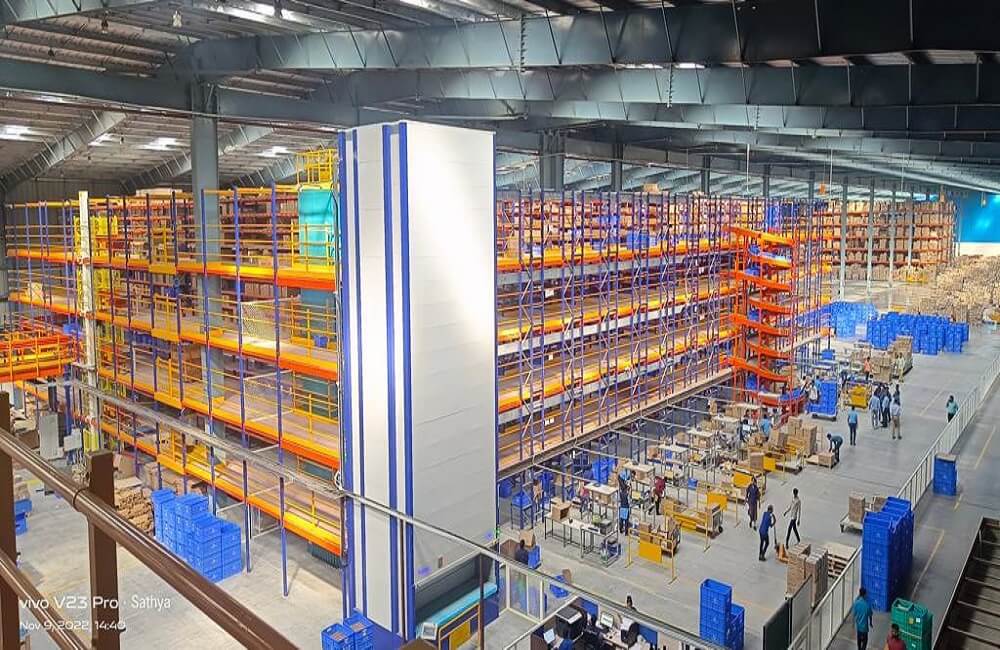India stands as the world’s foremost consumer of gold, with a market characterised by complete awareness and penetration. Rooted in our rich heritage and traditions, gold holds a significant place in our lives. It serves as a beautiful form of savings, becoming our saviour in times of need. However, what goes behind ensuring that the gold reaches you securely?
 India is not a major ‘producer’ of gold due to the absence of major operational gold mines. Hence, all the gold consumed within our nation is imported. The intricacies of the supply chain and logistics involved in the journey of gold, from the import of bullion bars and rough stones to the manufacturing and distribution of finished gold and diamond jewellery, present a captivating, interesting, and important subject. As ordinary individuals, we often overlook or fail to realise the complexity and critical nature of managing such precious cargo logistics.
India is not a major ‘producer’ of gold due to the absence of major operational gold mines. Hence, all the gold consumed within our nation is imported. The intricacies of the supply chain and logistics involved in the journey of gold, from the import of bullion bars and rough stones to the manufacturing and distribution of finished gold and diamond jewellery, present a captivating, interesting, and important subject. As ordinary individuals, we often overlook or fail to realise the complexity and critical nature of managing such precious cargo logistics.
Historically, jewellers or “Angadias” handled valuable shipments through personal or public transport, relying on trust without proper security, documentation, or insurance. This informal supply chain often led to external attacks, robberies, and internal fraud, with almost no scope for recourse if things were to go wrong.
Organized Retail and Logistics
After the 90s liberalisation, the jewellery landscape saw a shift, led by Tata’s Tanishq, which introduced transparency, standardised buying, premium retail experience, pan-India network, and a promise of purity. This marked the beginning of organised and formalised jewellery retailing, prompting the need for professional logistics partners to handle the large and complex supply chains. Thus, the organised precious cargo logistics sector took shape in the early 2000s. With the rise of organised retail, including prominent brands like Tanishq, GRT, Malabar, Joy Alukkas, P C Jewellers, TBZ, Reliance Jewels, Senco and local players such as P C Chandra, Waman Hari Pethe, Ranka Jewellers, P N Gadgil, etc., the importance of organised precious cargo logistics became evident to the jewellery retailers.
The jewellery industry thrives on sales during festivals and weddings. Retailers choose their products at B to B jewellery exhibitions and trade shows, where they place orders with manufacturers. To facilitate the transportation of their precious gold, diamonds, gemstones, and silver products to and from these significant exhibitions and trade shows, jewellers and manufacturers take the services of precious cargo logistics providers.
Government Regulations and Compliances
The government’s push for compliance through measures like GST, e-invoice, and mandatory hall-marking has led to a significant shift toward adherence. This has accelerated the role of organised precious cargo logistics providers. As the world’s largest consumer and importer of gold and silver, India recognised the need for its own India International Bullion Exchange (IIBX) to transition from a price taker to a market maker.
IFSCA as a regulatory authority has laid out clear guidelines on who and how the vaulting and logistics activities shall be performed. Sequel was the first operational IFSCA audited and approved vaulting and logistics company. The requirement to become an approved vault manager includes the minimum net-worth requirement, prior domain experience, and knowledge in managing large, multiple vault operations, and an impeccable track record as a company. Additionally, SEBI has introduced a gold spot exchange, with Sequel appointed as the vault manager based on financial strength, operational competence, and a proven track record.
Precious Cargo Logistics – What is unique and different?
Unlike regular packages, documents, or typical e-commerce and food/grocery deliveries, precious cargo logistics function on an entirely different plane. The standard of performance must be exceptional in all aspects, including:
· Lowest TAT (considering daily gold price fluctuation)
· Highest security at vault and in-transit (zero loss/pilferage)
· Strong security infrastructure & physical security
· Stringent compliance (KYC/customs & tax documentation)
· High-end & secure technology to monitor, track & trace everything in real-time
· Vast domestic & global network
· Strong company financials with an impeccable track record

Founder, MD & CEO
Sequel Logistics
Besides these factors, the most important element that is unique & different in this niche logistics domain, is the culture & mindset of the team that runs & manages the operations. The synergy of people, processes, and technology is imperative not only for ensuring secure delivery of shipments but also for providing real-time updates to the customer, with no room for errors. For instance, customers expect details about the authorised person picking up the shipment every time. Similarly, the shipment should only be handed over to the verified recipient at the designated address. Rigorous internal and external auditing and certifications go a long way in ensuring that the processes are robust and foolproof.
London Bullion Market Association (LBMA), Responsible Jewellery Council (RJC) and Transported Asset Protection Association (TAPA APAC) certifications are some of the international certifications that are important and essential.



